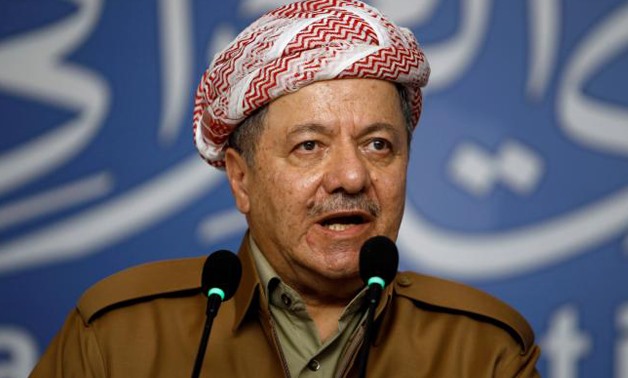
Iraqi Kurdish regional President Massoud Barzani speaks during news conference with Ammar al-Hakim, leader of the Islamic Supreme Council of Iraq (ISCI), in Baghdad, Iraq, September 29, 2016 - REUTERS/Khalid al Mousily/File Photo
ARBIL - 8 June 2017: Iraq's Kurdish region, which will hold a referendum on statehood on September 25, has been autonomous since 1991 and has played a major role in the war against jihadists.
Situated in the rugged, mountainous north of Iraq, the oil rich region is home to nearly 4.7 million people -- between 15-20 percent of the Iraqi population.
It is mainly made up of Kurds, who are mostly Sunni Muslims, alongside Christian and Turkmen minorities.
Officially comprising Arbil, Dohuk and Sulaimaniyah provinces, Iraqi Kurdistan also claims other territory including oil-rich Kirkuk province -- a dispute that is a major source of contention with Baghdad.
Iraqi Kurdish peshmerga forces have been in sole control of a chunk of Kirkuk province since federal forces withdrew when faced with an offensive by the Islamic State group in the summer of 2014, while the jihadists hold the southwest of the province.
Iraqi Kurdistan has major oil resources, but has been hit hard by falling crude prices, which have cut into its main source of revenue.
Kurdish forces have played a significant role in the war against IS, and have been an important ally of the US-led coalition against the jihadists.
They took part in the massive operation to retake Mosul from IS, which was launched in October 2016, capturing territory near the city but stopping short of entering it.
The region has also taken in hundreds of thousands of people driven from their homes by the jihadists.
Iraqi Kurdistan, whose capital is Arbil, became formally autonomous in 2005 under the constitution which set up a federal republic.
But it had gained de facto autonomy after the 1991 Gulf War over Kuwait when Western powers intervened to protect Kurds against an onslaught by the forces of Iraqi dictator Saddam Hussein that led hundreds of thousands to flee to neighbouring countries.
The United States and its allies set up no-fly zones in north and south Iraq, with the former helping to shield the Kurds.
Elections in 1992 established the regional parliament, with seats split between the Kurdistan Democratic Party (KDP) and the Patriotic Union of Kurdistan (PUK).
Disputes between the two parties led to deadly armed clashes between 1994 and 1998.
Kurds then joined US troops in 2003 to help overthrow Saddam.
The Iraqi Kurds have kept their dialects, their traditions and a clan-based organisation, with regional politics dominated by two main families.
Massud Barzani, the leader of the KDP who was elected president of Kurdistan in 2005, has remained in power despite the expiration of his term amid criticism from the opposition.
Barzani declared on February 3, 2016 that the "time has come" for the country's Kurds to hold a referendum on statehood.
"This referendum would not necessarily lead to (an) immediate declaration of statehood, but rather to know the will and opinion of the people of Kurdistan about their future," he said.
Iraqi Prime Minister Haider al-Abadi urged Kurdistan to drop any plans for independence, warning that it could not do without Iraq.
On Wednesday the presidency said the Kurdish region will hold a referendum in September.
"The date for the independence referendum shall be Monday, September 25, 2017," it said in a statement.
"It will be on that day when the people of the Kurdistan region, as well as those living in the disputed areas, will cast their votes on whether they accept independence," the statement said.


Comments
Leave a Comment